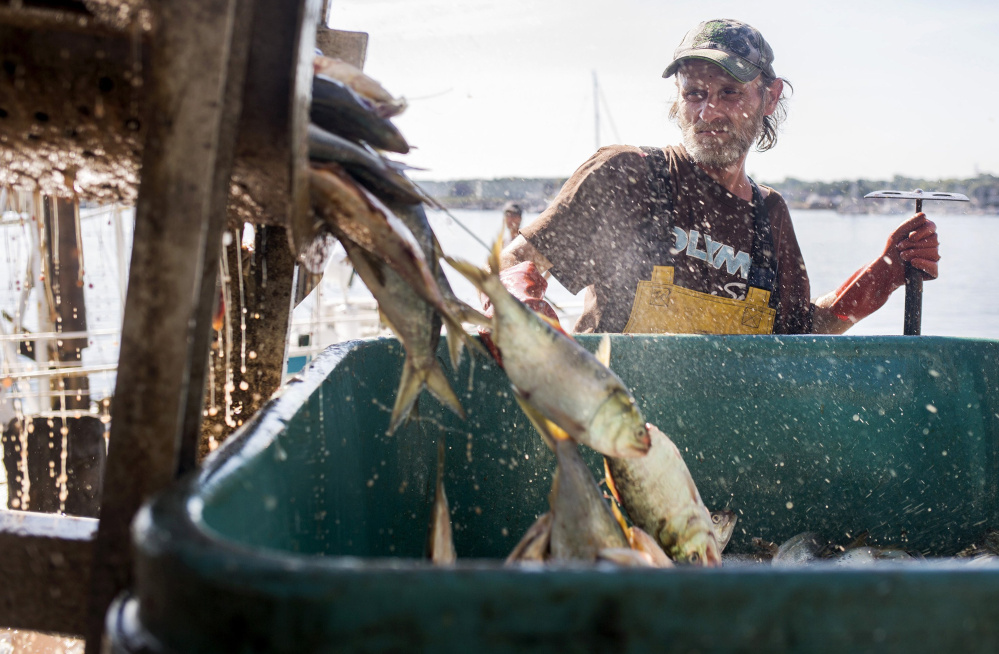Regulators voted Wednesday to increase the annual quota for menhaden in 2017, giving Maine lobstermen a welcome boost in the supply of a popular bait fish, but no relief for Maine fishermen who want a bigger share of the national menhaden harvest.
The Atlantic States Marine Fisheries Commission has struggled to set its quota for the oily forage fish, also known as pogey, with members split between wanting to maintain the annual menhaden catch at 187,880 metric tons and those who say the stock has rebounded enough to raise the quota.
On Wednesday, as the commission gathered for its annual meeting in Bar Harbor, the menhaden board voted 16-2 to increase the annual quota by 6.5 percent, to 200,000 metric tons, with Pennsylvania and the U.S. Fish and Wildlife Service holding out for keeping the quota unchanged.
Some member states had wanted to raise the quota by 20 percent or 40 percent, saying that government scientists believe there is no chance that even an increase of that size would lead to overfishing of the population, which appears to have rebounded after years of decline.
“Science says the stock’s in good shape,” said Bill Adler of the Massachusetts Lobstermen’s Association. “I find it difficult that we can deal with overfishing, we can do a good job of cutting things down, but then we have success and we don’t know what to do with it.”
Others wanted to maintain the current quota, saying it is still too early to say that the fish has really recovered. They note that survey data of juvenile menhaden is still incomplete, and that the data they do have shows the southern juvenile stock is still struggling.
The board’s decision to raise the quota last year by 10 percent was enough for now, they said.
“There is lots of talk about how there are more fish out there, and it seems like there are, but that’s not science, that’s anecdote,” said William Goldsborough of Maryland’s Chesapeake Bay Foundation. “This commission has always shied away from making decisions based on anecdote.”
Maine voted against maintaining the current menhaden catch levels, and seconded the recommendation of a 6.5 percent increase. Terry Stockwell of the Maine Department of Marine Resources called that increase a “workable compromise” for the divided board.
He told the board that the increase would “do absolutely nothing for the state of Maine,” but boosting the supply of lobster bait is a top priority for industry groups such as the Maine Lobstermen’s Association, which has been writing op-eds calling for a higher menhaden quota.
Association Director Patrice McCarron said lobstermen, who landed lobster s worth $500 million, which in turn generated nearly $2 billion in economic activity in Maine in 2015, are paying exorbitant prices to bait their traps this year because of the herring shortage.
“Our coastal communities depend on this revenue for their economic vitality and Maine lobstermen depend on a steady bait supply to generate landings,” McCarron wrote in an op-ed published in several Maine newspapers, including the Portland Press Herald, and industry magazines.
But an increase in the national menhaden catch doesn’t address Maine’s desire to claim a bigger portion of the annual harvest. In 2016, Maine was allowed to land just 166,000 pounds of menhaden, which is not even 1 percent of the national annual quota of 414.2 million pounds.
In comparison, the Virginia fleet is alloted 349.9 million pounds of annual menhaden landings.
The Atlantic fisheries commission will discuss the possible redistribution of the annual menhaden catch in 2017.
The small silver fish can be found from Nova Scotia to northern Florida. It is generally considered too oily for human consumption, but is prized as a source of omega 3 fish oil and as bait by commercial and recreational fishermen. It is also a prime source of food for whales and seabirds.
Environmentalists’ concerns about a shrinking stock were partly behind a decision by the fisheries commission decision to institute a quota system in 2012. The science behind the low stock surveys came under fire, however. In the past five years, higher survey numbers suggest the fishery is rebounding.
Penelope Overton can be contacted at 791-6463 or at:
poverton@pressherald.com
Twitter: PLOvertonPPH
Send questions/comments to the editors.



Success. Please wait for the page to reload. If the page does not reload within 5 seconds, please refresh the page.
Enter your email and password to access comments.
Hi, to comment on stories you must . This profile is in addition to your subscription and website login.
Already have a commenting profile? .
Invalid username/password.
Please check your email to confirm and complete your registration.
Only subscribers are eligible to post comments. Please subscribe or login first for digital access. Here’s why.
Use the form below to reset your password. When you've submitted your account email, we will send an email with a reset code.